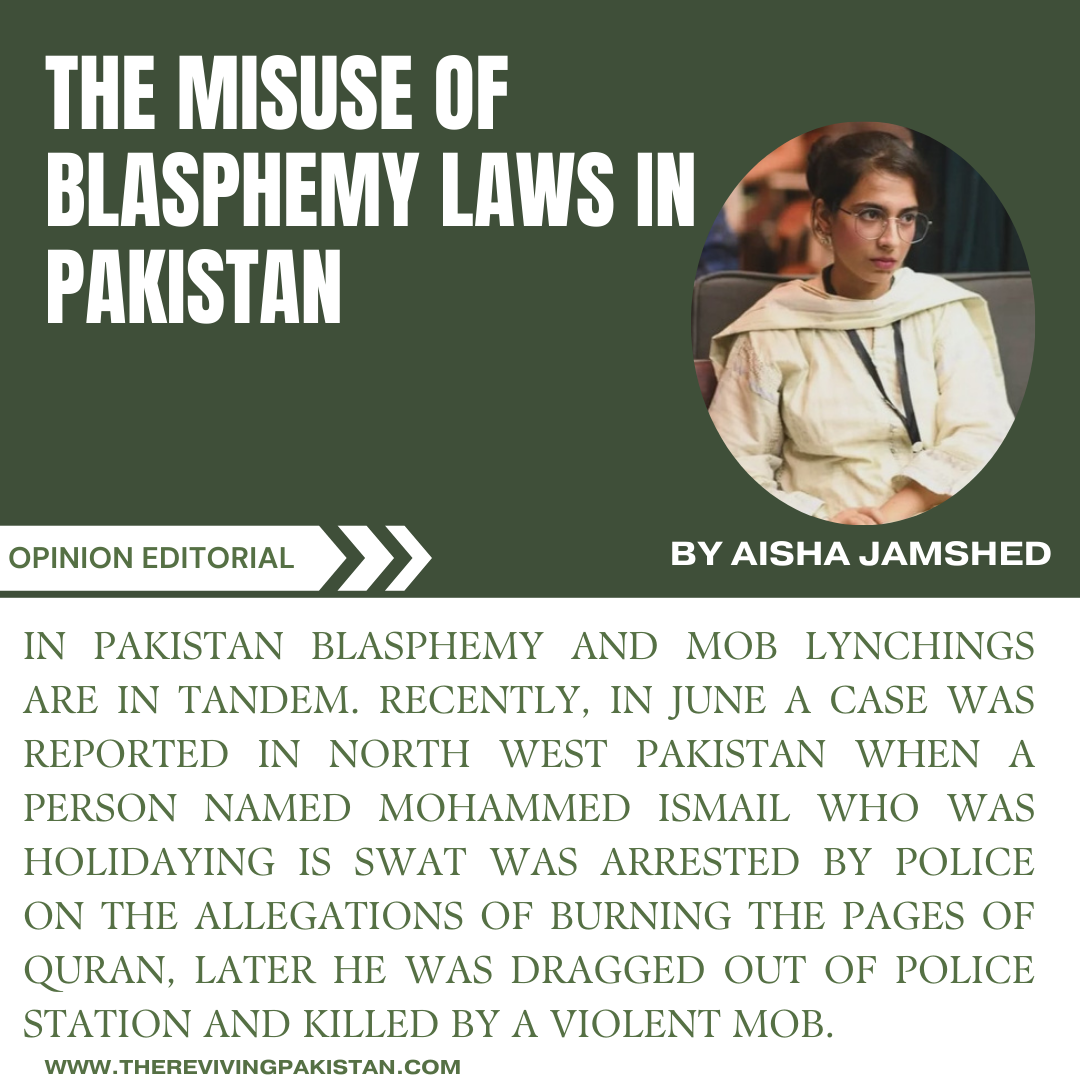About the Author(s)

Aisha Jamshed
Author is a 3rd semester law student, enrolled in LL.B 5 years program at the Hamdard School of Law, Karachi. She works as a researcher at a legal non-profit organization.
In Pakistan blasphemy and mob lynchings are in tandem. Recently, in June a case was reported in North West Pakistan when a person named Mohammed Ismail who was holidaying is Swat was arrested by police on the allegations of burning the pages of Quran, later he was dragged out of police station and killed by a violent mob. In this incident, not only was the accused affected, but the mob also assaulted the police station where the accused was being held for interrogation. If we delve into the past cases of mob lynching against blasphemy in Pakistan, the critical question to consider is why the police is unable to prevent the mob from seizing the accused or whether the police is intentionally choosing to capitulate? According to the critics, blasphemy laws in Pakistan are often violated by vigilante mobs ignorant of the country’s law, zealots who sugarcoat their extremism and label themselves as custodians of religion. According to the media sources, since 1987 approximately 2,000 people have been accused of blasphemy and 88 have been killed.
The blasphemy law says that any “derogatory remarks”, etc, in respect of the Holy Prophet [Muhammad] either spoken or written, or by visible representation, or by any imputation, innuendo or insinuation, directly or indirectly shall be punished with death, or imprisonment for life, and shall also be liable to fine.”
Reportedly, in most of the cases the allegations against the accused remain unproven as before the commencement of trial, mob trials are held where either the accused is killed or is extricated by the police at the final hour averting imminent peril otherwise. Judges trying the cases against blasphemy have allegedly reported the pressure to deliver convictions. Hence, convictions are common but no accused has ever been executed but hundreds of people are languishing in jail for being the suspects of blasphemy. Almost 89 people have been killed by mobs since 1990 to 2021 and these executions are branded as extrajudicial executions.
Blasphemy is an exceptionally sensitive issue in Pakistan, particularly when the laws are exploited. These laws originate from the British colonial era but were substantially reinforced during Zia’s regime of Islamization. The punishment against blasphemy ranges from life imprisonment to death penalty in most of the cases the accused is also liable to fine.
According to the reports more than 90% of the allegations of blasphemy are false. The state often aligns with the accusers rather than safeguarding vulnerable minorities, as the police are frequently unable to quell the violence, this leads to delayed justice. Stats says about 53 people are in jail custody as of 2023 in Pakistan over blasphemy accusations. Intolerance is burning Pakistan and is deeply ingrained in our societal norms also it’s a vital reason for mob lynching against blasphemy allegations. The other factor that leads mobs to violate laws is lack of awareness, people aren’t aware about the constitutional granted rights, constitution protects accused rights and are given right to be heard and right to free and fair trial. The Constitution also guarantees minorities the right to practice their religion; however, vigilantes often disregard that a single accusation of blasphemy should not be used as a pretext to demolish the places of worship for an entire community.
It is apparent that these are not the blasphemy laws in Pakistan that are inherently flawed; the issue lies with the law enforcement agencies, which fail to protect citizens from prejudice and often permit others to take the law into their own hands.
It is hoped that our system evolves to safeguard each individual, hold everyone equally accountable under the law, and ensure that our Constitution is upheld as more than just a legal document.

